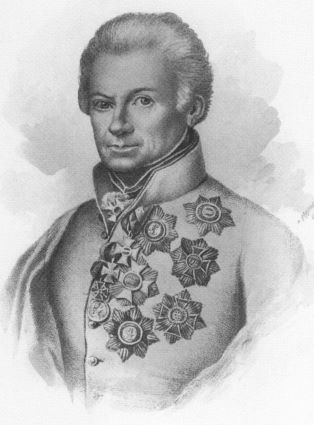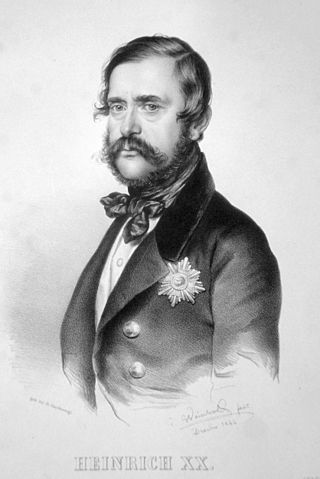Related Research Articles

Reuss was the name of several historical states located in present-day Thuringia, Germany. Several lordships of the Holy Roman Empire which arose after 1300 and became Imperial Counties from 1673 and Imperial Principalities in the late 18th century were ruled by the House of Reuss.
Greiz is a Kreis (district) in the east of Thuringia, Germany. Neighboring districts are Saale-Holzland, Saale-Orla, district-free city Gera, the Burgenlandkreis in Saxony-Anhalt, Altenburger Land, and the two Saxon districts Zwickau and Vogtlandkreis.

Greiz is a town in the state of Thuringia, Germany, and is the capital of the district of Greiz. Greiz is situated in eastern Thuringia, 40 kilometres (25 mi) east of state capital Erfurt, on the river White Elster.

The Principality of Reuss-Gera, called the Principality of the Reuss Junior Line after 1848, was a sovereign state in modern Germany, ruled by members of the House of Reuss. It was one of the successor states of the Imperial County of Reuss. The Counts Reuss, with their respective capitals and Residenzen at Gera, Schleiz, Lobenstein, Köstritz and Ebersdorf, were all elevated to the title of prince (Fürst) in 1806. Their successor branch heads shared that title, while their cadets were also each titled prince (Prinz). Thus all males of the family were properly "Prince Heinrich Reuss, J.L.", without use of a nobiliary particle, although for convenience their branch names remained in colloquial use.

Bad Köstritz is a town in the district of Greiz, in Thuringia, Germany. It is situated on the White Elster river, 7 km northwest of Gera. Bad Köstritz is known for the Köstritzer brewery and its Schwarzbier.

Hohenleuben is a town in the district of Greiz, in Thuringia, Germany. It is situated 12 km northwest of Greiz, and 19 km south of Gera.

The Principality of Reuss-Greiz, officially called the Principality of the Reuss Elder Line after 1848, was a sovereign state in the German Empire, ruled by members of the House of Reuss. The Counts Reuss of Greiz, Lower-Greiz and Upper-Greiz were elevated to princely status in 1778 and thereafter bore the title of Prince Reuss, Elder Line, or Prince Reuss of Greiz.

The People's State of Reuss was a short-lived state in what is now Thuringia. The state was formed on 4 April 1919 after the reigning princes of the two Reuss principalities abdicated and elections were held in both states. The People's State of Reuss had a non-contiguous area of 1,143 square kilometers, 211,324 inhabitants (1919) and was divided into three districts.

Charles Christian, Prince of Nassau-Weilburg, till 1753 Count of Nassau-Weilburg, was the first ruler of the Principality of Nassau-Weilburg between 1753 and 1788.

Heinrich XV, Prince Reuss of Greiz was the fourth of six sons born into the reigning family of the Principality of Reuss. At the age of fifteen he joined the army of the Habsburg monarchy and later fought against Ottoman Turkey. During the French Revolutionary Wars he became a general officer and saw extensive service. He commanded a corps during the Napoleonic Wars. From 1801 until his death, he was Proprietor (Inhaber) of an Austrian infantry regiment.

Heinrich XXII, Prince Reuss of Greiz was the reigning sovereign of Reuss-Greiz, a small principality of the German states, from 1859 until his death in 1902.

Heinrich XI, Prince Reuss of Greiz was the first Prince Reuss of Greiz from 1778 to 1800.

Heinrich XIII, Prince Reuss of Greiz was Prince Reuss of Greiz from 1800 to 1817.

Heinrich XIX, Prince Reuss of Greiz was Prince Reuss of Greiz from 1817 to 1836.

Heinrich XX, Prince Reuss of Greiz was Prince Reuss of Greiz from 1836 to 1859.

Heinrich XXIV, Prince Reuss of Greiz was the last reigning Prince Reuss of Greiz from 1902 to 1918. Then he became head of the House Reuss of Greiz, which became extinct at his death in 1927.
Henry VI of Plauen was Burgrave of Meissen, Lord of Plauen and Lord of Schleiz and Lobenstein.

Caroline of Hesse-Homburg (1819–1872), was a Princess consort of Reuss of Greiz by marriage to Henry XX, Prince Reuss of Greiz. She was the regent of the Principality of Reuss-Greiz during the minority of her minor son Heinrich XXII, Prince Reuss of Greiz, from 1859 until 1867.

Wilhelmine Louise, Princess Reuss of Greiz, born as Princess Wilhelmine Luise of Nassau-Weilburg was a German princess. She was a Princess-consort of Reuss of Greiz from 1800 until 1817, and was a daughter of Prince Charles Christian, Duke of Nassau-Weilburg and Carolina of Orange-Nassau, daughter of William IV, Prince of Orange.
Heinrich Reuss is the name of many male members of the German noble House of Reuss. It may refer to:
References
- 1 2 Gonschior, Andreas. "Der Volksstaat Reuß Landtagswahl 1919". Wahlen in der Weimarer Republik. Retrieved 18 May 2021.